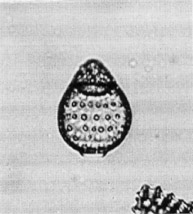 Dictyoprora
pirum (Ehrenberg)
Dictyoprora
pirum (Ehrenberg) Dictyoprora
pirum (Ehrenberg)
Dictyoprora
pirum (Ehrenberg)Eucyrtidium pirum Ehrenberg, 1873, p.232; 1875, pl.10, fig.14
Dictyoprora pirum (Ehrenberg), Nigrini, 1977, p.251, pl.4, fig.8
Shell three-segmented, smooth, hyaline. Cephalis small, spherical with few circular pores; no apical horn. Vertical tube short, cylindrical, laterally directed. Collar stricture indistinct. Thorax inflated with two or three transverse rows of circular pores. Lumbar stricture distinct. Abdomen much inflated in normal view, but laterally compressed: four to seven widely spaced, transverse rows of circular pores. Pores also widely spaced. Distal opening relatively small with well-differentiated, but short, poreless peristome and smooth termination (Nigrini, 1977).
Based on 10 specimens. Total length 88-120 µm; maximum breadth 65-83 µm (Nigrini, 1977).
A three-segmented form with the last segment having sparse, transversely aligned pores, and being compressed in the [lateral] plane (Riedel and Sanfilippo, 1978a).
D. pirum is distinguished by its sparsely pored, inflated, laterally compressed abdomen (Sanfilippo et al., 1985).
This three-segmented, smooth, hyaline form constantly possesses an inflated abdomen that is laterally compressed, four to seven widely spaced transverse rows of small circular pores, and terminally a well-differentiated, short, poreless peristome (Sanfilippo et al., 1985).
D. pirum is found in all tropical localities of latest middle Eocene to early early Oligocene age. Its morphotypic first appearance lies within the Podocyrtis goetheana Zone and its morphotypic last appearance lies within the Theocyrtis tuberosa Zone.
Additional illustrations can be found in Riedel and Sanfilippo, 1971, pl.3E, figs.10-11.